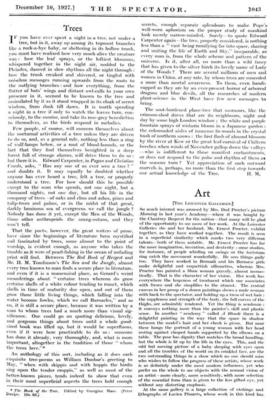Trees I F you have ever spent a ni g ht in a
tree, not under a tree, but in it, away up among its topmost branches like a rock-a-bye baby, or sheltering in its hallow trunk, you must have realized how very much alive the creature was: how the leaf sprays, or the loftiest blossoms, whispered together in the night air, nodded to the Pleiades, danced in slow rhythms all the night through: how the trunk creaked and shivered, or tingled with noiseless messages running upwards from the roots to the outlying branches : and how everything, from the flutter of bats' wings and distant owl-calls to your own presence in it, seemed to be known to the tree and assimilated by it as it stood wrapped in its cloak of secret wisdom, from dusk till dawn. It is worth spending a night in a tree if only to watch the leaves turn, con- sciously, to the sunrise, and take its rose-grey benediction to themselves, as the birds respond in melodies. Few people, of course, will concern themselves about the nocturnal activities of a tree unless they are driven to do so, and, as a general rule, nothing less than a ring of wolf-lamps below, or a rout of blood-hounds, or the fact that they find themselves benighted in a deep forest full of strange alarms, will drive them to do so: but there it is. Edward Carpenter, in Pagan and Christian Creeds, asks, "Has any one of us ever seen a tree ? " and doubts it. It may equally be doubted whether anyone has ever heard a tree, felt a tree, or properly understood a tree. For how should this be possible except to the man who spends, not one night, but a thousand nights, not one day, but all his life in the company of trees—of oaks and elms and ashes, pines and tulip-trees and palms, or in the midst of that great, darkly luminous sea of evergreens we call the jungle? Nobody has done it yet, except the Men of the Woods, those other anthropoids the orang-outans, and they won't tell.
That the poets, however, the great writers of prose, have since the beginnings of literature been mystified and fascinated by trees, some almost to the point of worship, is evident enough, as anyone who takes the trouble as it were of pearl-fishing in the ocean of unfading print will find. Between The Red Book of Hergest and Mr. H. M. Tomlinson's The Sea and the Jungle, almost every tree known to man finds a secure place in literature, and even if it is a nonsensical place, as Gerard's weird meanderings about " certaine trees whereon do grow certaine shells of a white colour tending to russet, which shells in time of maturity doe open, and out of them grow those little living things, which falling into the water become fowles, which we call Barnacles," and so on, it is still a secure place, because it was written by a man to whom trees had a much more than visual sig- nificance. One could go on quoting delicious, lovely, and gorgeous things about trees until a whole good- sized book was filled up, but it would be superfluous, even if it were here practicable to do so: someone has done it already, very thoroughly, and, what is more important, altogether in the tradition of those "whom the trees love."* . An anthology of this sort, including as it does such exquisite tree-poems as William Dunbar's . greeting to May, "when with skippis and with hoppis the birdis sing upon the tender croppis," as well as most of the better-known pieces, tends indeed to show that even in their most superficial aspects the trees hold enough * The Book of the Tree. Edited by Georginti Masc. (Peter Davies. 10s. 0c1.) secrets, enough separate splendours to make Pope's well-worn aphorism on the proper study of mankind look merely narrow-minded. Surely—to quote Edward Carpenter again—the tree, properly considered, is nothing less than a "vast being ramifying far into space, sharing and uniting the life-of Earth and Sky," inseparable, as every man is, from the whole scheme and pattern of the universe. Is it, after all, no more than a wild fancy that has given to the silver birch its lovely name of Lady of the Woods? There are several millions of men and women in China, at any rate, by whom trees are conceded a more than mortal awareness. To them, even handi- capped as they are by an ever-present horror of arboreal dragons and blue devils, all the researches of modern plant-science in the West have few new messages to bring. The soot-burdened plane-tree that murmurs, like the crimson-shod doves that are its neighbours, night and day by some high London window; the white and purple fountain sprays of wistaria bloom in a Japanese garden: the colonnaded aisles of immense fir-woods in the crystal hush of northern snows: the first flush of almond blossom by the river at Kew or the great leaf-carnival of Chiltern beeches when winds of November gallop down the valleys —who is indifferent to these manifest enchantments, or does not respond to the pulse and rhythm of them as the seasons turn ? Yet appreciation of such outward marvels is, perhaps, no more than the first step towards










































 Previous page
Previous page